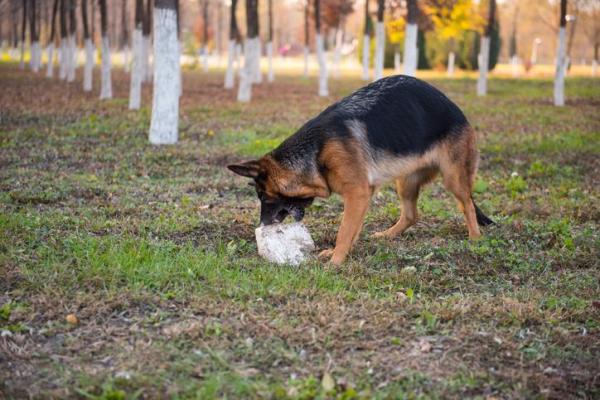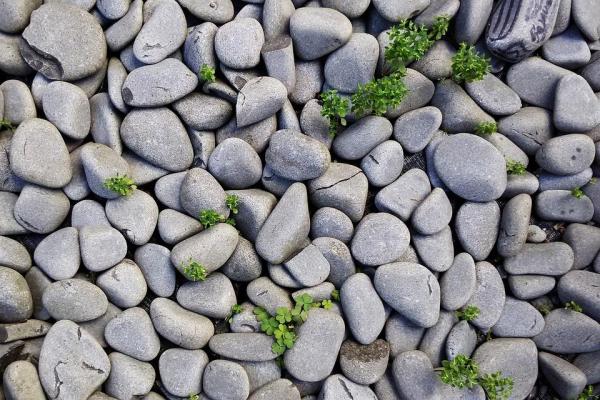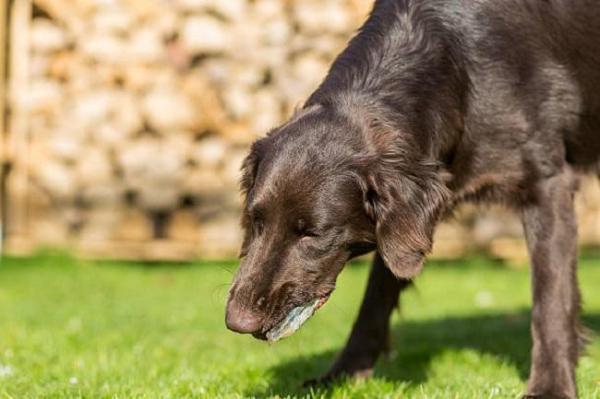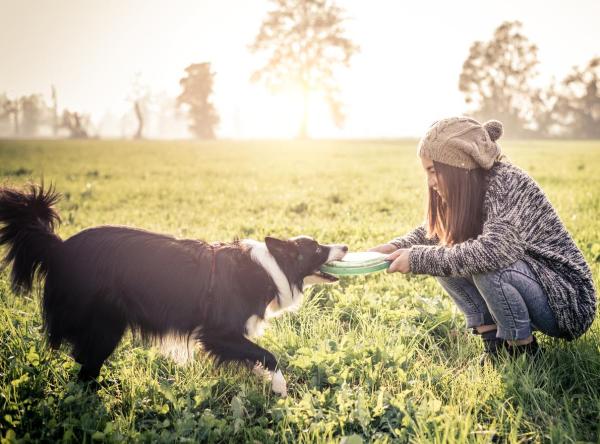
The gluttonous behavior of the dogs can, at times, be funny. However, when it comes to a dog eating rocks, this is a serious and dangerous problem which needs to be addressed accordingly. If your dog appears to be eating everything and anything, it can easily ingest toxic chemical substances, excrement or foreign bodies which are harmful to its health.
If you have noticed that your dog is eating rocks or stones, you may be wondering why. For more about why does my dog eat rocks, its causes and how to treat this strange behavior, keep reading here at AnimalWised.
Why does my dog eat rocks?
The ingestion of stones is extremely dangerous, as it can irritate and inflame a dog’s gastrointestinal mucosa, which can lead to gastritis in dogs. In more serious cases, a dog that eats stones can eventually suffer an intestinal perforation, which can result in internal bleeding and/or the death of the animal.
So, why does my dog eat rocks? The reasons for this behavior can vary drastically. In order to correctly analyze why your dog is eating rocks, you will need to pay attention to its daily routine, health status, feces, general day-to-day behavior and overall nutrition.
If you notice that your dog is eating stones or rocks, we recommend consulting a veterinarian as soon as possible. Keep reading below for more about dog eating rocks symptoms, causes and treatment.

Dog eating stones problems - Causes
There are many reasons why a dog eats stones, however, here we list the most common causes of a dog eating rocks:
- Pica in dogs: pica syndrome in dogs (obsessive behavior) is a pathology that causes the ingestion of all kinds of food, including dirt, rocks and stones. For more, read why does my dog eat everything in sight?
- Discovery in puppies: is your puppy eating gravel? It is totally normal that, in the puppy stage, that dogs nibble and accidentally ingest all kinds of different objects, including stones. While this is somewhat normal it is not acceptable behavior. However, you should never remove a stone from your dog’s mouth with force, as this may cause it to swallow the rock quickly. Ideally, you should use this as an opportunity to teach your dog to release objects with positive reinforcement and without force.
- Stress and anxiety: stress in dogs can be caused by various things, such as lack of exercise, confinement, lack of mental stimulation, constant punishment, etc. A stressed or anxious dog will try to release this pent up energy by chewing excessively or eating rocks. This type of behavior is incredibly common in shelter dogs. Is your dog stressed? Find out by reading our list of 10 signs your dog is stressed.
- Demand for attention: dogs that spend a lot hours alone or do not receive enough attention may consume stones or other inedible objects (as well as act inappropriately) to attract the attention of their guardians. A dog prefers to be punished than not receive attention at all.This generally only occurs in extreme cases.
- Parasite infestation: several studies indicate that, in the wild, dogs eat plants or herbs to eliminate infestation of intestinal parasites. If you notice that your dog is showing symptoms of intestinal parasites such as scratching or dragging of its bum, as well as eating rocks, consult your veterinarian as soon as possible. For more, we recommend reading our article where we discuss everything you need to know about deworming dogs.
Dog eating rocks: symptoms
Sometimes, it is not always obvious that a dog has eaten rocks. In this case, you will need to analyze your dog’s feces to find out for sure.
However, if a dog begins to ingest larger stone, it will alter its health and behavior to a greater and more noticeable extent. Dog eating rocks symptoms include:
- Gagging, coughing, vomiting.
- Constipation or difficulty pooping (stones can "get stuck" in the intestines, preventing the dog from defecating normally).
- Presence of blood in the stool (the stones can cause perforations in the intestine, causing bleeding).
- Symptoms common to gastritis in dogs, such as vomiting, loss of appetite and weight, diarrhea, dehydration, lethargy, excessive drooling, etc.
- Weakness and loss of interest in your daily activities.
For more about analyzing your dog’s poop, we recommend reading:
- Blood in dog feces.
- Types of dog poop and what they mean.

My dog swallowed a rock: what to I do?
So, what happens when a dog eats rocks? If your dog has swallowed a stone or other foreign body, it is very important that you got to the vet as soon as possible. While there are many homemade methods to getting a dog to expel a stone, these are not recommended. If, for example, the stone is too big and you try to help your dog vomit or defecate it, it can cause severe damage to your dog’s gastrointestinal tract, worsening the case.
If you want to know how to make your dog expel a stone, you should consult a properly trained professional. In some cases, a vet may consider surgery to help remove the stone safely.
If, however, your dog has a rock or stone stuck in its throat, you will need to act immediately. For more, read what to do if my dog has something stuck in its throat.
How to stop puppy eating stones
We recommend paying attention to these following guidelines in order to prevent your dog from eating rocks, stones and foreign bodies:
- Provide your dog with a complete and balanced diet, according to its nutritional requirements (per age, breed and size).
- Offer your dog enough physical activity, always respecting the type and quantity of exercise most appropriate to your dog's age.
- Always use appropriate toys when playing with your dog. Never tease or joke with your dog with the use of objects such as stones, as this will lead your dog to believe they are okay to ingest.
- Provide your dog with adequate mental stimulation, intelligence games and / or dog activities.
- Enrich your dog’s environment so that your dog can expel energy effectively and safely.
- Offer your dog adequate preventive medicine, always respecting its vaccination and periodic deworming schedule. In addition, make sure to visit your veterinarian for a check up every 6 months.
For more, we suggest taking a look at our article where we discuss, what do dogs need to be happy and healthy?

If you want to read similar articles to Why Does My Dog Eat Rocks?, we recommend you visit our Behavioral problems category.